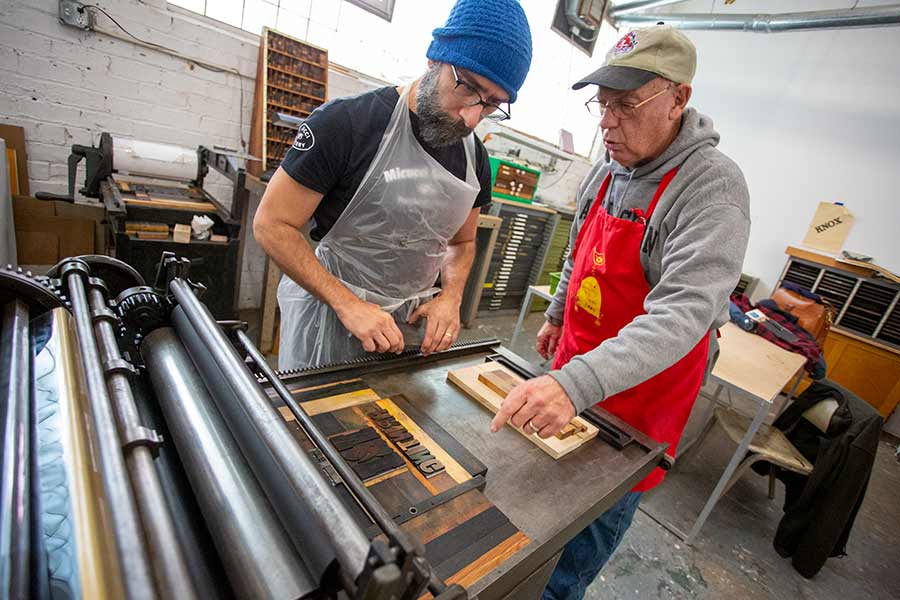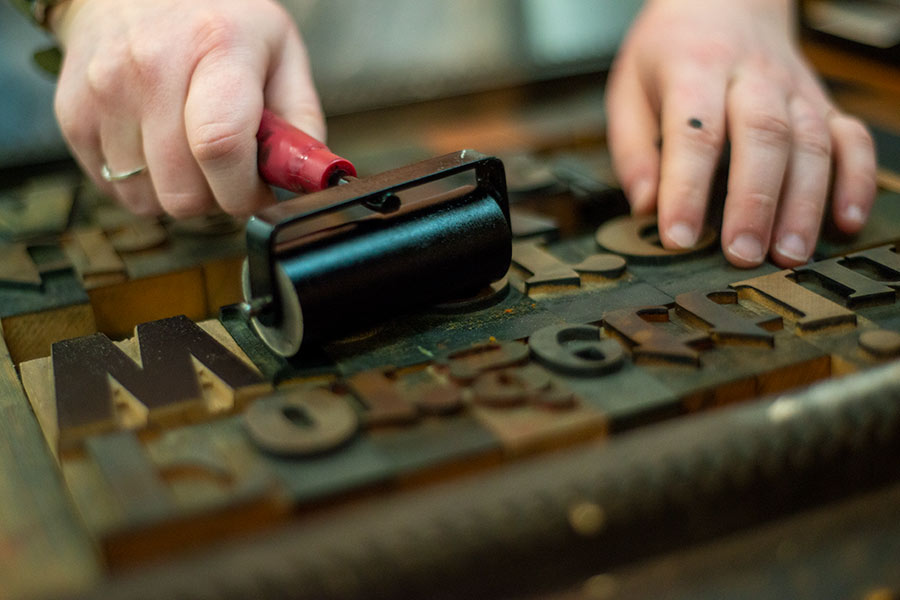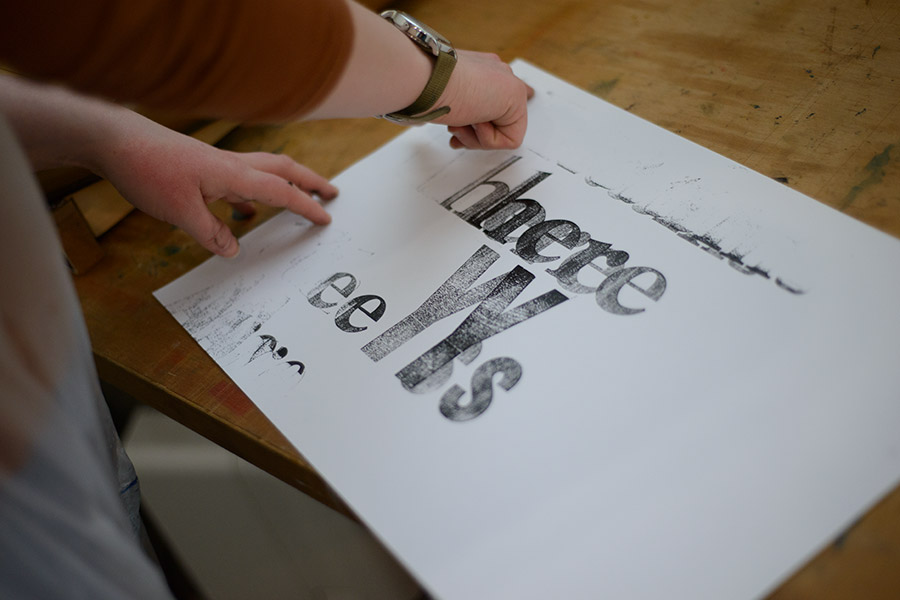Lily Lauver '21 works at the letterpress. Photo by Steve Davis
All day, we spend our time typing sentences in seconds. On our phones, people type with just their thumbs, with autofill words and phrases. In so many ways, we’ve written human intervention out of the act of writing itself. But letterpress printing involves human intervention deeply. It is a process where individual letters are set in lines by hand, locked into a press, inked, then pressed with paper to create a print. The human hand is a risk to any one of these parts of the process, is both integral and invisible to the success of the printed page.
Harry “Hal” Keiner ‘67 wanted to give students an opportunity to learn about typography, printmaking, and graphic arts through practical means. On a summer day in 2016, he arrived in Galesburg from North Carolina with a collection of letterpresses and other printing equipment in the back of his pickup truck. Together, he and Knox faculty set up the letterpress shop in The Box, a space in downtown Galesburg that houses local businesses along with the sculpture and ceramic studio of Associate Professor and Chair of Art Mark Holmes and the writing studio of Professor of English Monica Berlin ‘95. Her studio is called The Space.

After arriving at Knox a year and a half later, I spent many warm Sunday afternoons writing and reading at The Space. Monica picked up quickly on my love of her collection of broadsides—excerpts of prose and poetry, often with an accompanying illustration—on the walls. About half of these many broadsides were the work of Kelly Clare ’16, the first student to take up letterpress at Knox. Monica showed me the letterpress shop, and I started there as a sophomore in an independent study with Associate Professor of English and director of the creative writing program Nicholas Regiacorte, who has been involved in the letterpress shop since its inception. Nick taught me how to use the letterpresses, and that term I printed poems and bits of prose, as well as a series of excerpts from postcards that my dad wrote. Slowly, I got to know this slow craft.
When the poet Ross Gay gave a reading on campus last spring, he observed that boredom has become a rarity, and thus a gift, in our lives. I think that poring over a case of type, sorting and forgetting again and again where the ys are, the quiet and the solitude of it, encourages boredom: empty space wherein I can think around, with, about the letterpress and its intricacies. I’ve lost countless minutes fixing typos, have come to understand authors’ choices down to the letter, thought that one day, if ever I write a poem that would hold up to an hours-long process like this, I’ll print it. Over time, letterpress work has situated itself more and more internally in my process as a thinker and creator.

The shop is bright and neutral, smelling of strange oil and, when the heater kicks on, like an iron. The echoes in the letterpress shop encourage hushed tones. This is where I work, sit up straight in front of a flat drawer full of small heaps of letters. Line by line, space by space, through the poems I print. The craft demands focus—so often my mind has wandered away from the work, coming back to realize a typo. In letterpress, there is no backspace, just sorting back through the type, pulling out the tweezers, performing an operation on the growing block of text in front of me.
Letterpress work, in its most perfect print, is humble. In the shop, we call things what they are. The word letterpress itself describes this: a leaving behind, an impress of inked text. We call the spaces that are made of copper coppers. There is a slug cutter for cutting slugs, soundless metal strips that slide between each line. When the printed page is left without a blemish or fold, the letterpress printer has written herself out of the work completely. Active homage. Letterpress then is really a joyful process—each letter, character, and space set by hand.

After these many solitary, thoughtful hours in the letterpress shop, I found an entirely new feeling toward the craft when I saw our broadsides in the hands of their authors, in the hands of this writing community. When writer Peter Orner came to campus for a Caxton reading in the fall, Nick printed a broadside to honor the event. When poet and translator Hai-Dang Phan read from his collection Reenactments for a recent reading, Nick and I collaborated on a broadside of Phan’s poem, “Osprey.” Since, we created another broadside for Professor of English Gina Franco’s reading, printing an excerpt from her new poetry collection, The Accidental. These prints are the first of a series made under the name Prairie Moon Press, a title dreamed up for the space by Robin Metz, co-founder of Knox's Program in Creative Writing, who passed away in 2018.
My successes in the letterpress shop are products of the work of a community, lively and warm. Professors like Monica, Nick, and Mark take it upon themselves daily to include students in legitimate, meaningful work—to notice students, to ask that we take our work seriously together. And last fall, Hal donated yet another press, this one a self-inking machine called the Challenge. Its size—1,200 pounds—enables us to produce more prints and make a greater impact on our community with this craft.
Letterpress work often doesn’t make sense; it is slow, tedious, and yields few prints. But I believe there’s something in us still that loves the feeling of paper, the interface of reading from a made, physical object.
At Hai-Dang Phan’s reading, I watched my friends, professors, classmates, and other attendees pick up the broadsides and understand them as a human-made, communal artifact. Letterpressed artifacts preserve the moment by acknowledging our comings-together as acts of community, acts of humanity. So my hope is that the letterpress shop can continue to be a space for people to disconnect from digital noise and look beyond it—to understand words as things we can hold, as things we can think about deeply even as we type them, letter by letter.